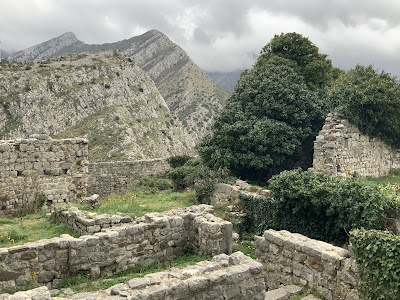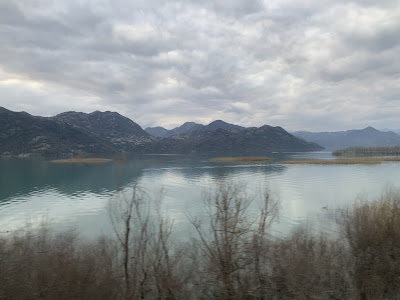Back in Montenegro, my first port of call (literally) is the seaside town of Bar. Unlike Nikšić, Bar at least gets a mention in the guidebook: in their infinite wisdom, the Lonely Planet writers characterize it as a “shabby port city”. I thought it was quite charming in its way: modern shops, hotels and restaurants, and a quiet, leafy seafront centred around the palace of King Nikola Petrović, who was at the helm when Montenegro regained much of its autonomy from the remnants of the Ottoman Empire. Along the waterfront to the north is a spot that Google Maps describes as the former border between the Habsburg and Ottoman empires, and the southernmost point of the former. Today it’s just a bridge, with no special features.
I hadn’t quite had my fill of the Adriatic coast, especially its seafood, so I enjoyed some lovely stuffed octopus and white wine for dinner. After that I had the urge to head to a bar, for some reason (lol), but I wasn’t tempted by the ones that were open, so I retired for a good night’s sleep.
 |
| The Mala Rijeka viaduct |
The next day I hiked up the road to Stari Bar, the old town. This spot was virtually abandoned when I was there, which added an extra level of atmospheric spookiness to the ruins of the monastery, mosques, and fortress. The place has seen many uses over the years. The churches were mostly converted into mosques by the Turks, then used to store large amounts of gunpowder, which, when the conspicuously pointy buildings on top of a conspicuously pointy hill were inexplicably struck by lightning, then blew up. (Really, it seems like someone might have pointed out that this was a possibility.)
 |
| Stari Bar from the approach |
 |
| Ruins and mountains |
 |
| The Montenegrin flag flying over the ramparts |
After lunch surrounded by adorable (if scruffy) cats, it was time to leave the Adriatic behind for good. I hopped on a train that traversed the country south-to-north, going back via Podgorica to Kolašin, in the hills. The line – and in fact the whole Montenegrin rail network – is a marvel of engineering, and was mostly constructed during the twentieth century. Heading north, after a long tunnel through the coastal mountains, the line crosses Lake Shkodër on a bridge/causeway. It then makes its way across the plains to Podgorica, and thence snakes up into the hills, crossing the Mala Rijeka viaduct pictured above, When it was built, it was the world’s highest viaduct, a title it held until 2001. I also love how in this part of the world the stationmasters – impeccably outfitted with little cap – always stand proudly in front of their stations when trains are going past, even when the train doesn’t stop.
 |
| Retro chic in the compartments on the train |
 |
| Lake Shkodër from the causeway |
After Mala Rijeka, darkness started to fall, and simultaneously we ascended into thick, all-encompassing fog. Judging by phone signal, we were in tunnels for much of the onward journey, but honestly it was hard to tell by looking out of the window; I begin to see why they called this place Black Mountain.
Kolašin, my destination, also gets short shrift in Lonely Planet, being described only as the gateway to the Biogradska Gora national park. This time I really can’t judge, as it’s pitch black and raining, and if all goes to plan I won’t be here for long. I trudged damply down the road into town, found somewhere to get food and charge my iPad, and returned to the station.
One thing that can’t be said about the Montenegrin rail system is that passengers are kept well-informed. There are no signs on the outside of the trains, no departures board, and no announcements once you’re on the train. I guess that, when your country’s entire rail timetable fits onto one sheet of A4 paper, locals mostly know what the trains are and where they’re going. By this point I’ve traversed almost all of the Montenegrin passenger rail network, the exception being the stretch north to Bijelo Polje and onward into Serbia, which is what I’m booked onto tonight, one of Europe’s less plausible sleeper journeys. Excited by this prospect, I was surprised and not particularly amused when the stationmaster interrupted my blogging to brusquely inform me that the train wouldn’t be running due to track damage north of Bijelo Polje. With zero alternative on offer (nonchalant shrug from the stationmaster), I started looking for places to hole up in Kolašin. Ten minutes later I was informed that a train would, in fact, be running after all – but a) only as far as Bijelo Polje, where I’d have to wait two hours for a connection, and b) half an hour late. This is much better than nothing, so we’ll see how it goes! And in all likelihood I will be somewhat sleep-deprived tomorrow…
No comments:
Post a Comment